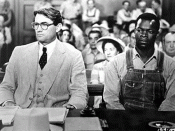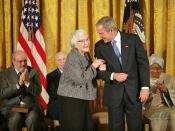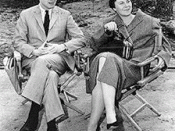The novel "To Kill a Mockingbird", written by Harper Lee, deals with issues of racism using the voice of Scout Finch, the narrative's young protagonist. Scout is a young girl living in the fictional town of Maycomb, a small isolated community that is tainted with racial discrimination and prejudice. Scout lives with her widowed father Atticus, her brother Jem and the household's black nurse, cook, and substitute mother Calpurnia. In "To Kill a Mockingbird", Scout, Jem and Dill (the children's friend) are gradually yet brutally introduced to racial prejudice and adult injustice through their experiences and adventures as children living during the Great Depression in America. Throughout the Great Depression, a time in which economic prosperity was at an all-time low, segregation, discrimination and racism were prominent, especially towards the black population of America.
"To Kill a Mockingbird" has a strong theme of racism which Scout highlights in the novel, especially in Part II, which is the court case of a black man named Tom Robinson.
Tom was falsely accused of raping and severely beating a white girl named Mayella Ewell, and is taken to court by the person who actually beat Mayella; her father, Bob Ewell.
Another occurrence of racism which is not only common in "To Kill a Mockingbird" but all over America in this time, was an etiquette structure called 'Jim Crow' laws. Because of the Jim Crow laws, black Americans were denied basic civil and human rights. The rules are seen during the court case. The Jim Crow system was very important in places like Maycomb, and when Mayella Ewell made advances towards Tom Robinson, it was a major 'crime' in the eyes of the community, and another crime was for Tom to feel sorry for Mayella. This was one of the reasons that Tom was taken to court.
Racism is also apparent in other individual cases, like against Atticus, who is a lawyer, for choosing to defend Tom in court, and against Mr Dolphus Raymond for marrying a black woman. Both of these many and other characters in the novel are sympathetic to the troubles faced by the black population of the community, which is why they were confronted with racism.
The Great Depression lasted from the end of 1929 until the onset of the Civil War, a time when unemployment was extremely high and entire country of America was suffering from great poverty. Although the 13th Amendment had been passed and freedom had been granted to all black slaves, the 'Jim Crow' system was still in force in the Southern States of America, and because of the sudden lack in jobs, unnecessary blame fell upon the Negroes because they were supposedly lesser than white people. This set of unwritten rules was developed because of the perceived supremacy of white people, and they dictated the way black people were to behave towards whites across the Southern States of America. In Maycomb these behavioural rules affected every character in the book, and this was especially apparent during the cross-examination by Mr Gilmer (the other lawyer) in the court case. It eventuated that Tom had felt sorry for Mayella, and this was seen as a major breach of the etiquette laws and seen as a 'crime'; "'Yes suh. I felt right sorry for her, she seemed to try more'n the rest of 'em -' 'You felt sorry for her, you felt sorry for her?' Mr Gilmer seemed ready to rise to the ceiling. The witness realised his mistake and shifted uncomfortably in his chair. But the damage was done. Below us, nobody liked Tom Robinson's answer," (Page 201). This quotes makes obvious the disdain which was felt by most white people towards blacks in Maycomb, and Tom's comment caused great affront to Mayella, the jury, judge and townspeople because this did not comply with the rules. Black people were meant to feel inferior to whites, so it was not acceptable for Tom to feel sorry for Mayella.
It was also against the code when Mayella kissed Tom because of the thought that blacks were beneath whites, so Tom was not worthy of her attentions. Because of the supposed wrongness of her actions, Bob Ewell beat Mayella severely, blacking her eye and bruising her throat. Mayella's injuries were the reason that she and her father took legal action against Tom; to find an excuse for her injuries. In Atticus's closing speech to the courtroom and the jury, he outlines Mayella's 'crime' even though it wasn't a legal offence. "'She was white, and she tempted a Negro. She did something that in our society is unspeakable: she kissed a black man. Not and old uncle, but a strong young Negro man. No code mattered to her before she broke it, but it came crashing down on her afterwards,'" (Page 208). Atticus told them how serious it was in these days to violate the code, and that it would result in Mayella being spurned and looked down upon by the rest of Maycomb, so Mayella and Bob Ewell took Tom to court for a fabricated crime in order to redeem themselves in the eyes of the town.
Hatred and racism is expressed towards a few individuals in "To Kill a Mockingbird" particularly Mr. Dolphus Raymond and Atticus Finch. Mr Raymond is a white man who married a black woman and has mixed children. Because of this many white people in town believe that Mr Raymond is a wicked man; "As Mr Dolphus Raymond was an evil man I accepted his invitation reluctantlyâ¦" (Page 204). They say that he lived this way because he was a heavy drinker, but Mr Raymond just pretends to drink whisky when all he is drinking is Coca Cola. "'Wh- oh yes, you mean why do I pretend (to drink)? Well, it's very simple,' he said. 'Some folks don't - like the way live. Now I could say the hell with them, I don't care if they don't like it. I do say I don't care if they don't like it right enough - ⦠I try to give 'em a reason you see. It helps folks if they can latch onto a reason. When I come to town, which is seldom, If I weave a little and drink out of this sack, folks can say Dolphus Raymond's in the clutches of whisky - that's why he wont change his ways. He can't help himself, that's why he lives the way he does.'". (Page 204 - 205) Mr Raymond explains to Dill and Scout that if he pretends to be a drunk then he will escape the dirty looks, insults and prejudice that he knows he and his family would be faced with if people knew that he married a black woman, someone who was meant to be beneath him, by his own choice.
Atticus Finch is also greatly discriminated against. This is because he decided of his own free will to defend Tom to the best of his ability in court, which caused great controversy among the townspeople because of the Jim Crow laws, which declare that black people were less than white people, and weren't deserving of a fair trial. "'I guess it ain't your fault if Uncle Atticus is a nigger-lover besides, but I'm here to tell you it certainly does mortify the rest of the family -,'" (Page 88). This quote is said by Francis, Scout's cousin, and it reflects the opinions of many others in the town that Atticus should not have taken up the case to actually give Tom a solid defence. Atticus knows that it may damage his reputation but he defends Tom anyway to maintain his belief in himself and to fulfil his moral obligation to represent and win the case for an innocent man, be he black or white. "'This case, Tom Robinson's case, is something that goes to the essence of a man's conscience - Scout, I couldn't go to church and worship if I didn't try to help that man.'"In "To Kill a Mockingbird", the major occurrence of racism was during the court case of a black man named Tom Robinson who was wrongly accused of raping a young white woman, Mayella Ewell. Atticus Finch defends Tom in court as a human being not just a 'nigger', but because of the prejudice against black people it was thought in the beginning that Atticus is only defending Tom Robinson because he had to. When it was discovered that Atticus actually wanted to give Tom a proper defence, people in the town were quite shocked and frequently insulted Atticus about his decision. It was also said that Atticus is going against his breeding by defending a 'nigger', as was said by Mrs Dubose, the children's neighbour; "'Not only a Finch waiting on tables but one in the court - house lawing for niggers!' Jem stiffened. Mrs Dubose's shot had gone home and she knew it; 'Yes indeed, what has the world come to when a Finch goes against his raising'â¦'Your father's no better than the niggers and trash he works for!'" (Page 107). This quote shows how deeply ingrained it was in the people of Maycomb that African Americans and people who supported them were sinful. Legal action against Tom was taken when Mayella was found by her father, beaten supposedly by Tom. Mayella said that he had also taken advantage of her, but this was not what had actually taken place. The correct sequence of events was discovered later in the court case; that Mayella jumped on Tom, hugged him about the waist and kissed him on the face, and even though Tom had no reason to lie it was automatically assumed by the jury and most of the white portion of the court that he was lying, just because he was a black man, as this statement said by Atticus shows; "'The witnesses for the state, with the exception of the sheriff of Maycomb county, have presented themselves to you gentlemen, to this court, in the cynical confidence, that their testimony would not be doubted, confident that you gentlemen would go along with them on the assumption - the evil assumption - that all Negroes lie, that all Negroes are basically immoral beings that all Negro men are not to be trusted around our women, an assumption one associates with minds of their calibre.'" (Page 208). This quotation demonstrates the thoughts of many white townspeople in Maycomb, which led to an unfair prejudice in the court against Tom for the simple reason that he was a black man, and therefore a liar. Mayella and her father both knew this, which was a contributing factor towards them charging Tom with rape; they used the jury's prejudice to their advantage, because no one would believe the word of a black man against a white man. This type of racism and prejudice was a frequent occurrence throughout American history, and did not change until well after the Civil War.
"To Kill a Mockingbird" thoroughly discusses many aspects of racism. Harper Lee deals with it in a very realistic yet simple way through the eyes of Scout Finch, the novel's young, but gradually wiser and more mature, central character. Racism is a significant topic throughout the novel; from racism against the entire race of African Americans in America, to individuals like Atticus and Tom Robinson, through to the court case where racial prejudice is the reason for the wrongful conviction of an innocent black man. Harper Lee portrays Atticus Finch as a man of great integrity who truly understands that some birds exist simply to sing for us and make life more beautiful for the world, like the mockingbird, which is symbolic of Tom Robinson, Boo Radley and perhaps even Scout and Atticus himself, and that these people who do nothing but good are usually the ones who get 'shot'. He teaches us that, even though your cause may be lost before you start, it is worth the struggle to maintain your belief in yourself and to contribute some goodness to our world. As Atticus said, "Shoot all the bluejays you want, if you can hit 'em, but remember it's a sin to kill a mockingbird.'" (Page 96).
Bibliography:Lee, Harper. To Kill A Mockingbird. Middlesex, England: Penguin Books Ltd, 1967





